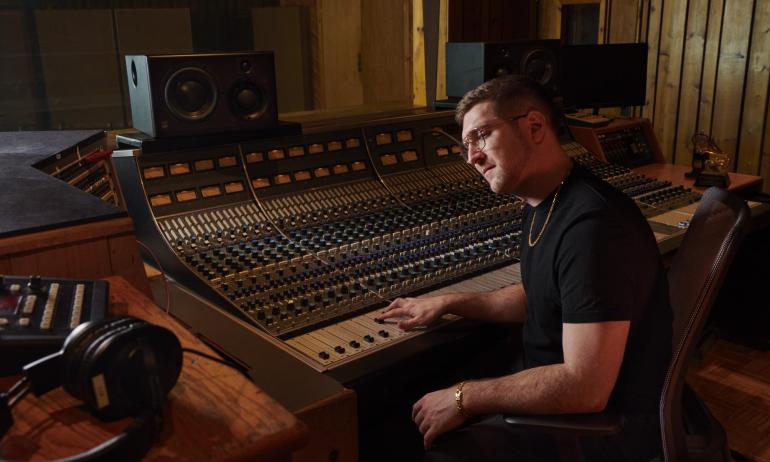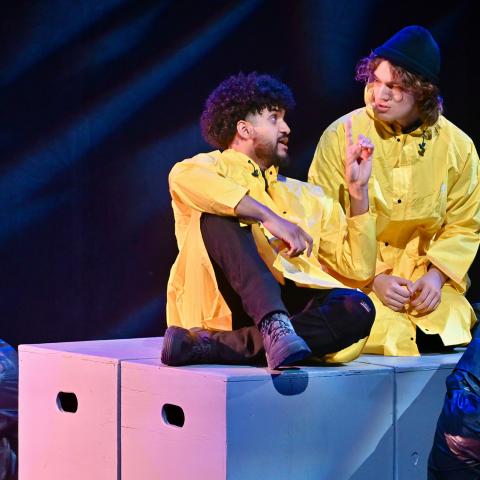Berklee Launches New Independent Recording and Production Major

A Berklee student records vocals in a campus practice room.
Image by Cristian Avila
Later this year, four decades after the launch of Berklee's highly competitive music production and engineering (MP&E) major, the college will roll out a new major that vastly expands the number of students who will have access to a world-class training in the art of music production: independent recording and production.
Whereas enrollment in the MP&E major is capped due to limited studio availability on campus, the independent recording and production major will train students to produce professional-quality music anywhere using their own personal music production toolkit: a computer, a suite of production software and plugins, a four-preamp recording interface, a microphone package, and a pair of headphones.
Not only does this new major enable more Berklee students to study production and engineering, it also allows them to delve deep into a ubiquitous modern production modality that's built around a personal toolkit used outside of a traditional studio setting.
"Most of this style of work is done in a nontraditional fashion—in a rehearsal space, in an apartment, or even on an airplane" says Rob Jaczko, chair of the Music Production and Engineering Department, which administers this new major. "That's part of the training: How do you maximize the emotional and technical impact, based on the fact that you're not in a $2 million acoustically designed room with a $600,000 console?"
In fact, the artistry of this approach comes in part from how the engineer and producer selects and makes use of those unconventional settings. "I think students will be very creative in how and where they execute their projects."
We can do wholly professional projects, we can go out and win Grammys and be commercially competitive using a personal production toolkit, forgoing all of the infrastructure of the traditional recording studio.
—
Recording artists have always been improvising, using the tools they have available in the spaces at their disposal to make the best sounding recordings they can. "Led Zeppelin, Elton John, the Stones—they all recorded in chateaus in France and mansions in England," says Jaczko. "Remote recording and nonstandard recording has been around since the very beginning." More recently, think of Billie Eilish and her brother Finneas producing her first album in Finneas's bedroom, or Justin Bieber's engineer Josh Gudwin mixing "Despacito" on an airplane.
The examples of producers and engineers making successful records outside of typical studios with only their own tools at their disposal are too numerous to list, but they all point to the guiding philosophy of this new major: "We can do wholly professional projects, we can go out and win Grammys and be commercially competitive using a personal production toolkit, forgoing all of the infrastructure of the traditional recording studio," says Jaczko.
A New Major Decades in the Making
Virtually as soon as Berklee's Music Production and Engineering Department was founded in 1983, student demand for the major outstripped the studio resources on campus. As the college grew and added more recording studios, the MP&E program also grew; but with each expansion and each decade that passed, still there were fewer available spots in MP&E than there were students who wanted to study in the program. Since the program’s inception, students wishing to enroll in the MP&E major have had to apply, and the current acceptance rate is around 30 percent.
Meanwhile, as powerful laptops, high-quality portable recording interfaces, and advanced production software and plugins have become standard tools of the trade for many artists and producers, the musical possibilities open to anyone with a modest personal production toolkit have expanded vastly. In 2013, the department launched a minor in recording and production for musicians, which began teaching students to use these tools to produce their own music. The minor has been a huge success, says Jaczko, and "an affirmation to us that a broader population at the college really wants access to these topics.”
Then, in 2020, COVID-19 caused all Berklee classes to move to remote instruction, and the shift prompted a deeper consideration of how production and engineering could be taught at the college without the use of the traditional studio spaces. "The pandemic was really the tipping point," says Jaczko. "Some of the pivots that we had to make during the depths of COVID 2020 and into 2021, with no access to the campus, and relying on all of our students having a personal toolkit of their own to complete their work...shaped our thinking that we've carried into the design of [independent recording and production]."
How to Produce Music Anywhere
The coursework in the new independent recording and production major will expand on the content in the recording and production for musicians minor (and all the courses in the minor will count towards the major). "The minor touches on these various topics of production, recording, and mixing, but there's only so much you can do in 10 credits," explains Dan Thompson, assistant chair of the Music Production and Engineering Department. So where the minor offers a course on recording and mixing techniques, for example, the major will offer three levels of mixing courses. "It gives you the opportunity to get into more advanced concepts of mix, and to further develop both the skills and aesthetics toward a professional-level finished project."
The independent recording and production major will also add coursework in technical skills such as mastering. And crucially, Thompson explains, it will offer training in "the business side of music production"—helping students answer the questions, "How does an independent producer/writer/artist find an audience—find a market? What are the income streams and how do you make a career from this craft?"
And much as the recording and production for musicians minor has appealed to artists looking to produce their own work, Jaczko and Thompson anticipate this new major will serve many students who want to learn the skills of the craft through self-production.
"In MP&E, students may not work on their own material until their capstone project, because it's very much focused on collaboration and helping artists find their voice," says Thompson, whereas independent recording and production students can spend more time focused on producing their own material, in addition to working with others. "Because of the nature of the workflow, the tools, and the types of projects involved, for a student who identifies as a writer/producer/artist, this new major is likely to be a perfect fit."
While the independent recording and production major offers a new pathway into the recording industry for Berklee students, it shares vital DNA with the MP&E major, which will continue to train students in more studio-based production and engineering. Both majors emphasize critical listening and production analysis, and they share a focus on "developing your voice as a producer, developing your personal aesthetic, developing your ability to communicate and to interact effectively with others, and to bring out the best in every participant in a given project toward a shared objective," says Thompson. "Those goals are irrespective of the toolkit."




